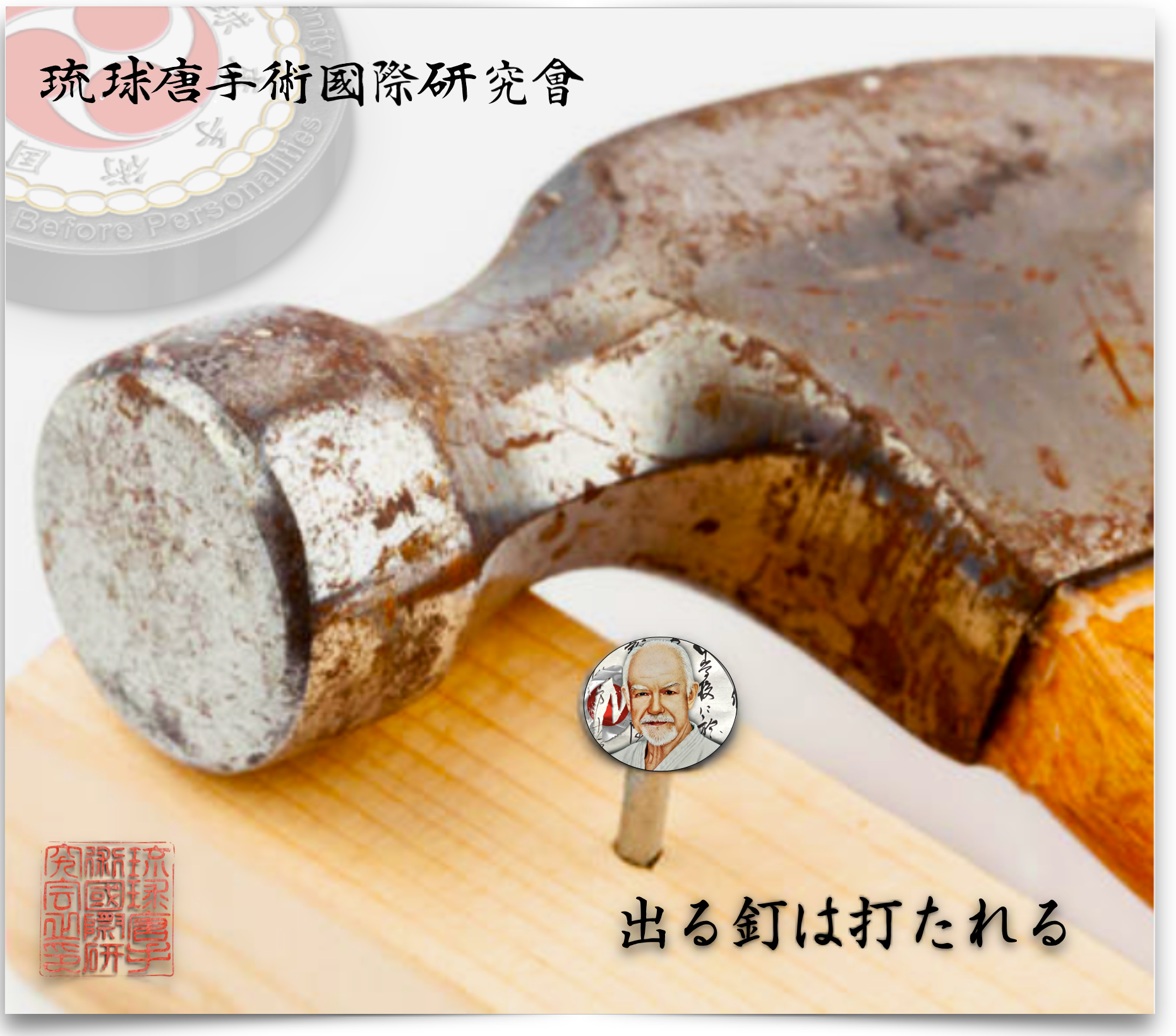「出る釘は打たれる」という興味深いことわざがあります。これは、目立つ人や違う考えを持つ人が、伝統的な保守的な人々によって厳しく批判されたり制裁を受けたりすることを表しています。このことわざは、日本社会において文化的な規範や信念、調和の取れた価値観に従わないことに関する問題を示しています。日本では、多くの人が社会の調和、平和、そして統一性を保つために、期待される通りに振る舞い、生活しています。これは文化に組み込まれた現象であり、期待される行動を助けるために機能する社会的なメカニズム「建前と本音」として知られています。建前は人が期待される行動を、そして本音はその人の本当の感情や内なる欲望を表します。
また、この考え方を支持する文化的なメカニズムとして、先輩・後輩システムがあります。これは、教育、ビジネス、産業、政治、軍隊、警察、そして武道など、さまざまな分野で見られる非公式な階層的な人間関係を表しています。創造性は許容されますが、それがあまりにも目立ったり、気を散らしたりしない限りです。21世紀の日本全体としては、個人主義に対する寛容さがより顕著になっているとはいえ、伝統的な保守主義の強い場面ではまだ限られたものです。もしも伝統がある行動を求めているのに、別の方法で行動する場合、トラブルに巻き込まれる可能性が高いでしょう。伝統を破ることが必ずしも悪いわけではありませんが、現状に挑戦する場合、そのシステムがまるでハンマーのようにあなたに降りかかることに備えるべきです。
一般的に、伝統的な文化の中では、個人の自由や個性を犠牲にしてでも、受け入れられた規則や儀式、プロトコルに従うことが期待されます。もし、現状に挑戦し、目立とうとすると、ハンマーが下されるでしょう。これは、創造性の問題というよりも、現状に挑戦しないというルールに従うことに関連しています。日本(沖縄を含む)の精神的な基盤は、儒教思想に深く根付いています。儒教に基づく先祖崇拝(孝)では、年長者が尊重され、彼らは権威の源として扱われます。この考え方は、伝統的な武道の中で特に顕著です。このため、権威に対して疑問を持つことは、批判的思考が奨励されないどころか、非常に失礼とされることが多いです。
東洋文化と西洋文化を比較すると、権力に対する認識が異なり、古典的な階層構造とより平等主義的な個人主義の対比が見られます。つまり、集団の調和と個人主義の対立です。西洋では、独立性を重んじ、個人主義を称賛する傾向があります。例えば、ブルース・リーは、既存の構造(または実践)の非効率な部分を再解釈し、より効率的な方法を見出す運動を先導しました。私の歴史的な研究においても、喜屋武朝徳や本部朝基のような先駆者たちが同じようなアプローチを取っていたことが分かりました。
伝統について私の考え
松尾芭蕉(1644-1694)は、「古人の跡を求めず、古人の求めたる所を求めよ」と述べ、伝統について的確に表現しています。この時代を超えた概念は、75年前の師匠が行ったことを盲目的に模倣するのではなく、彼らが求めたものを探求し続けることの重要性を語っています。同じくグスタフ・マーラー(1860-1911)も「伝統とは灰の崇拝ではなく、火の保存である」と述べています。IRKRSは、歴史的・科学的探求の精神を通じて、沖縄の先駆者たちが最初に追求したものをより深く理解し、改善し続けることで、伝統をコミュニティに生きた経験として伝えることを信念としています。これこそが伝統であり、これこそが道なのです。
だから、もしあなたが出る釘(私のように)なら、「ハンマー」とそれを振るう人々に注意してください!私は保証しますが、一部の人々は「枠に収まらない考え方」に不快感を示し、「あの人は危険だから近づかないように」と他の人に言うでしょう。
- 注: 私はこの問題について、1980年代後半から日本に初めて住み、権威に疑問を持ち始めた時から語ってきました。ジョー・スウィフトとのインタビュー(タイトルは「黒船」)は、英国の雑誌「Fighting Arts International(FAI)」のためにコリン・ホワイトヘッドとの一連のインタビューに基づいています http://www.koryu-uchinadi.org/Karatedo_Kurofune_Interview.pdf Original interviews: https://irkrs.blogspot.com/2017/12/karate-do-kurofune-black-ship-of-karate.html?view=flipcard
Creativity vs Conformity
By Patrick McCarthy
There is an interesting proverb about people who are different or conspicuous and get harshly criticized or sanctioned by the traditionally conservative;
Deru Kugi wa Utareru [出る釘は打たれる] means something like, “A Protruding Nail Gets Hammered Down.”
This proverb addresses the issue of not conforming in Japanese society with cultural norms, traits, beliefs, and accepted values of harmony. In Japan [most] everyone behaves and lives as is expected of them to keep the harmony, peace, and uniformity in their society. A social phenomenon built into their culture, which serves to help govern expected behaviors, is known as, “Tatemae & Honne” [建前と本音]; It contrasts a person’s expected behavior [Tatemae] with their true feelings and inner desires [Honne]. A cultural mechanism designed to help perpetuate this mindset is known as the Senpai [先輩, “senior”) ~ Kōhai [後輩, “junior”] System; It represents an informal hierarchical interpersonal relationship found in various walks of life; e.g. Education, Business, Industry, Politics, Military, Law Enforcement [and related emergency services] … and, the fighting arts.
Creativity is acceptable as long as it is not “too” different and does not stand out or create a distraction. For the most part, 21st-century Japan, as a whole, is much more tolerant of the classical issue of individualism, but it is not widespread, and much more noticeable with ultra-conservative traditions. If the tradition dictates you should behave in one way, but you behave in another, then most likely trouble awaits you. It’s not saying that breaking with tradition is necessarily a bad thing but, if you challenge the status quo, then be prepared for the system to come down on you like a hammer.
As a rule, people within culturally traditional groups, are expected to conform to such accepted rules, rituals, and protocols, even at the cost of individuality and personal freedom. If/when they dare to stick out [i.e. challenge the status quo], the force of the “hammer” will come down on them [as it has with me]. This is almost always more about toeing the line and not challenging the status quo than it is about actual creativity. Japan’s [i.e. Okinawa] spiritual foundation is steeped in Confucian thought; Confucian-based ancestor worship [filial piety] reveres its elders; Elders are regarded as patriarchs and original source[s] of authority. Nowhere is this more evident than within the traditional fighting arts! Thus, and by extension, this mindset does not encourage critical thinking [i.e. the questioning of authority]; In fact, such a thing is very often considered highly disrespectful.
When comparing traditional Eastern culture to the West, a different perception of power contrasts the classical hierarchical structure with a more egalitarian individualism; i.e. Group Harmony vs Individualism. In the West, we tend to place great value upon independence, and champion individualism; e.g., Bruce Lee spearheaded the movement about gleaning more efficiency from reinterpreting the common principles of a pre-existing structure [or practice], especially if/when it has become dysfunctional; My historical study into the practices of pioneers such as Kyan Chōtoku and Motobu Chōki revealed striking similarities.
My Thoughts on Tradition?
Matsuo Basho [松尾芭蕉, 1644-1694] aptly described tradition when he wrote, “Seek not to [blindly] follow in the footsteps of the men of old but rather continue to seek out what they sought.” This timeless concept says so much about keeping tradition alive, rather than blindly adhering to “exactly how the master did it 75 years ago!” Gustav Mahler [1860-1911] echoed the same sentiment, when he wrote, “Tradition is not the worship of ashes, but the preservation of fire.” The IRKRS believes deeply in keeping tradition a living experience for the community it serves through perpetuating the spirit of historical and scientific exploration; By continually seeking out to better understand and improve what the Okinawan pioneers originally sought.” This is tradition, and this is the way!
So, if you happen to be a protruding nail [like me]; beware of the “hammer,” and all those who wield it! I guarantee that some people [not all] will be offended by an “out-of-the-box mindset” and it will most likely cause them to tell other people to, “Stay away from you because, YOU ARE DANGEROUS!”
* Note: I have been speaking about this issue, since the late 1980s, during the time I first resided in Japan [and started to question “authority“]; Here’s an interview with Joe Swift [entitled, Kurofune … “The Black Ship”] based upon a series of interviews [by the same name] I did with Scotland’s Colin Whitehead, for the British magazine, “Fighting Arts International; aka FAI http://www.koryu-uchinadi.org/Karatedo_Kurofune_Interview.pdf Original interviews: https://irkrs.blogspot.com/2017/12/karate-do-kurofune-black-ship-of-karate.html?view=flipcard
